|
Lucy |
Digital Vs. Film I am currently undertaking a study on digital vs. film photography and require some various opinions from those interested, or working in the field. I am looking at product quality, cost efficiency, ease, reliability and a number of other aspects. If you could please assist me with your opinions or any comments it would be greatly appreciated. Thank you
|
|
|
|
||
|
Kerry L. Walker |
Lucy, if you are trying to stir up a hornet's nest, you sure asked the right question. Being a film photographer, here is my opinion. Product quality - Advantage - Film. Film has a greater exposure latitude. With film, you have a greater chance of getting a good picture if your exposure is off a little. Also, film has a greater dynamic range. If there is a wide range of light and dark in the picture, you stand a better chance of capturing that on film. As evidence, I offer a photo in my gallery entitled "Hot Springs Park". In the actual print, the left side, which is dark after being converted to a digital file, is well exposed, not too dark, not to light. The right side is much lighter but not blown out like it appears on the screen. Cost Efficiency - Advantage - Digital, after the purchase of the equipment. Digital memory can be reused after the photos are stored on a disk. Can't re-use film. Don't have to print every photo to see what you have. Just look on the screen and delete what you don't like. Ease - Don't see much difference. Light is light and photography is photography. Reliability - Don't see any advantage for either here either. Well, maybe slight advantage to film. I think the odds of a memory card going bad without you knowing it are a little greater than the chances of film going bad. Chances of either going bad are probably slim if the photographer is careful with his equipment. Main difference - Choice. You pick what works for you and go with it.
|
|
|
|
||
- Gregory LaGrange Contact Gregory LaGrange Gregory LaGrange's Gallery |
-OK, digital folks, tear me apart. I can take it.- Hasn't happened yet, eventhough you you keep saying that.
|
|
|
|
||
|
John A. Lind |
-----===== Digital =====----- Pro: Con: -----===== Film =====----- Con: This is what I could think of fairly quickly. Given a day or so to ruminate on it, there would likely be more pro/con for film/digital. -- John Lind
|
|
|
|
||
|
Irene Troy |
Lucy, I am sure that you will get many varying responses to your question, so let me add my two cents from the point of view of someone new to digital. One of the biggest advantages of digital, at least for someone who is relatively new to serious photography, is that you get almost instant information about what you did right or wrong. While still out in the field, while the scene is still in front of me, I can see my image and know if the exposure is right or if the confirmation actually reflects the area of the scene I want to reflect. I also find myself taking chances with digital that I may not have taken with film. I will try new things knowing that if I am not successful I have lost nothing. There are some things that I still use film for, mostly when speed counts or when trying to shoot extreme macro. However, this is only because I have yet to master digital for these purposes. Both film and digital have their pluses and minuses but the longer I shoot digital the more I like it and the more I want to learn.
|
|
|
|
||
|
Andrew Laverghetta |
In John's response, I find my reason for using digital. The main reason at least. I like taking the pictures and working on them myself. Most of my times going to a lab, any lab, has made me frustrated. Especially when making enlargements. Most of the time it's with white balance and color although I wanted an 8x10 and instead of just cropping off the side, they had to crop off the bottom as well. Not having done any darkroom stuff myself, I didn't know that they couldn't make an 8x10 without cropping off the side AND THE BOTTOM. That kinda emphasizes the grain in some faster films. Also, I had a picture that's in my gallery of a flute under tungsten lighting giving it the yellowish look. I had to bring in the original picture that had the specific color cast so they could match it. If they had color corrected the original 4x6 I wouldn't have seen how nice the picture looked with the oldish color cast. Also, I took some pictures recently on professional quality film and my prints that I got back from a lab that works on senior pictures and retouching old prints must have done something to my film because a lot of the pictures looked washed out and lacked something that I couldn't put my finger on. I know it wasn't the camera because my slides that I had been using for months before hand all looked great and my digital images all look great but these came back with something missing. Oh well, this is my end of it. I like doing the work myself but it will cost more to but the stuff to calibrate my moniter. All that stuff. Feel free to contact me if you want a more organized answer from me. haha. This was just kinda thrown together just like a lot of other responses. Hope this adds to your stuff.
|
|
|
|
||
- Gregory LaGrange Contact Gregory LaGrange Gregory LaGrange's Gallery |
Only one side needs to get cropped on a different proportioned blowup. Where'd you get that two sides need to be cropped?
|
|
|
|
||
|
Andrew Laverghetta |
I was going to ask about that but I forgot to at (is this true?) in my post. Anyway, I was at Cord Camera (not sure if that's a nation wide thing or just in the Midwest) and a guy there who seemed to know more about film than digital said that but he didn't sound too sure. I brought in a few slides for enlargment to 8x10 and it cut off the side (of course) but I noticed that everything that I had in the frame, particularly at the bottom, was cut off. This disappointed me because I wanted all that as I was using it as a quick "portfolio" for a job at my university. In the end, the just re printed it as an 8x12 for free. That's also something that I like about digital with who I have to work with is that I can crop it myself exactly where I want it cropped without overwhelming the person who takes my order. This person usually knows a lot less about printing than the actual technician(s). I'll make sure to bring this up next time I'm there. Thanks!
|
|
|
|
||
|
x |
So far, I agree with everything stated. Film has a better dynamic range. I use digital, however, for professional work due to the cost savings and for reasons already mentioned. I like only printing the "good ones". I like total color control. I like total overall control of every aspect. I have never liked my relationship with labs. I alos like the ease at which I can archive. I also like that I can provide digital negatives, and still keep my negatives too. I like being able to put my stuff on-line without the expense of scanning film. I like being able to have my stuff archived electronically so that when I search for a file, even if I have copied it to DVD, the program will tell me which DVD it is on. There are more benefits, IMO, to digital, from a business and artistic perspective. Although, from a pure image standpoint, film is a bit better. But, I do think that issue will be resolved soon. Also, it is sad that the cameras now are not built to last 50 or more years. But, I guess that's progress. If you look at cars, and many other mechanical things, they have all taken that same road. And, ultimately, it winds up for the better. Jerry
|
|
|
|
||
|
Jef Franklin |
I have to add that with digital you do not need to concern yourself what settings you will be shooting in before the shoot. With film the choice of film type can be critical. Some photographers even need to carry several camera backs with them so that they can switch from one film to another. The ease of changing ISO and White balance in camera can be a huge advantage. Also, the range of color temperatures that are recorded by digital cameras can be broader than that of film. Some cameras even record color information into the inferred and ultraviolet ranges. This requires different films for traditional cameras. For digital this only requires a few changes to the cameras settings or a few clicks of the mouse in post processing.
|
|
|
|
||
- Gregory LaGrange Contact Gregory LaGrange Gregory LaGrange's Gallery |
-I have to add that with digital you do not need to concern yourself what settings you will be shooting in before the shoot- wrong on that. way off.
|
|
|
|
||
- Bob Cournoyer Contact Bob Cournoyer Bob Cournoyer's Gallery  |
Gregory...Even I, the beginner, slipped off my chair at that comment... Bob
|
|
|
|
||
|
Melissa L. Zavadil |
Actually Gregory, he is right. You do not have to 'prepare' by going to the store and purchasing so and so number of this and that film. On a digital you turn a dial for this or that. You use and reuse and reuse over and over. Never goes bad, no storing in the refrigerator hoping that you can use it before it does. No buying and buying and buying. And for all the people that think that film grain is still better than digital you need to read up on the latest scientifically based proven study of this. Writen up in Popular photography based on the Mark 1Ds. By the way this obsolete arguement is a bunch of hodgepodge!! What is MORE likely to be going obsolete is NOT a digital card but the processing booths that process film. Good luck in the future trying to get these processed. I am really glad that there are still film people out there so we digital people have someone to pawn our outdated film cameras on so we can update our goods to 2005 and beyond! :o) Have two listed on ebay now!! :o)
|
|
|
|
||
|
Jef Franklin |
Thank you Melissa. That is exactly what I was referring to.
|
|
|
|
||
|
Andrew Laverghetta |
I read that the 1DS Mark II only out performs ISO 200 film. NOT all films. The media will EVENTUALLY go bad but not for a few years. I think it's ignorant to talk down to any one format. The preparation for the shoot is more like "posteration" because you do all this afterwards, which would usually take longer doing it yourself. When you go to a shoot, you don't just take pictures and then figure out what you're going to do with them afterwards. You have to plan just as much if not more as to what "film look" you're going for. It shouldn't just be an afterthought as the previous posts make it seem. Well, I believe that the minilabs or film processing will last a lot longer than some of you think. Black and white is still very strong and walmart just started selling TMAX400 (traditional black and white negative film). At least the walmart in my town consisting of around 12,000 people. They don't sell anything there that they can't process there from what I know. Please check your ego upon signing in...
|
|
|
|
||
|
John A. Lind |
Melissa, You need to read that article again (April 2005) . . . with care . . . and make note of their testing details instead of skipping to the bottom line. Film . . . is not film . . . is not film . . . not even at the same speed rating. I have absolutely no idea why Popular Photography chose to do what they did in the manner the did it. I'm surprised they haven't been lambasted for it. The entire test was completely skewed to "dumb down" film and favor the Canon digital (running in RAW mode no less). The 50mm lens used is excellent (presuming it was in good working condition). I have no qualms with the choice of camera bodies. However, Kodak Gold 100 is one of the WORST films by which to conduct a test of system resolution (EOS 3 + 50/1.4 EF). The Fuji Superia film they used earlier is better, but still not good. Both are cheap consumer films . . . the stuff of Wal-Mart ISO 100 film price wars. Let's have a race . . . the Indy 500 track should work . . . two cars circa mid-1970's . . . I get a 1.8 liter Porsche 914 (4 cylinder) . . . you get a 1.8 liter Volkswagen fastback, squareback or notchback. All have air-cooled pancake engines of same displacement. Don't like your Volkswagen? OK, use a Karman Ghia instead. Same fuel; we'll go 10 laps. Guess who's likely to win this. Reason? Same basic engines. However, the Porsche has computerized fuel injection, distributor, a different camshaft, much better suspension and 5-speed transmission. I don't know of anyone else who uses (or used) Kodak Gold 100 to seriously test system resolving power. I'm also suspect about its dating when they use "GA's" former name (Kodak's two/three letter film designators). Their current long title for it is "Bright Sun" and has been for some time. Kodak makes ISO 400 films with substantially finer grain (equals greater resolution). Had they wished to do an adequate test, Pop Photo would have used a film such as T-Max 100, Kodachrome 64, Velvia 50, Provia 100F, or Ultra Color 100UC. Even Portra 160 NC or Ultra Color 400UC, or High Definition 400, while poor choices, would have been significantly better than Gold 100. Yet another demonstration that while figures don't lie . . . I learned long ago to take Pop Photo "testing" with a grain of salt . . . many grains of salt . . . many huge grains of salt. -- John Lind
|
|
|
|
||
|
John A. Lind |
Andrew, The guy at Cord was blowing smoke. A full 35mm frame enlarged to the size class you wanted would be 8x12; an 8x10 would chop 2 inches off of the long side . . . only. Depending on the slide mounts, and whether they have square corners, they may need to take a little off of the other dimension to get inside the round corners. It's one of the reasons I remount slides into carriers (frames) that have square corners before having them printed if they are in the round cardboard frames. Not hard to do. When shooting 35mm I keep in mind its 2:3 aspect ratio and the cropping that must be done along the long dimension for 5x7, 8x10, 11x14, etc. Even then, I may simply have them print an 8x12 or 11x16 and crop the print myself if I want to make it a more standard size. I don't worry about it as much with the 645 . . . a slight margin around all sides is all it needs. Its 3:4 aspect ratio is fairly close. For fine art prints that will be mounted in gallery or salon presentation, I don't worry about any of this. If I'm willing to pay for cropped enlargement to a standard size (and if that will work) I'll go for that. If not, I have it printed full frame, crop the print and mount it accordingly. There's no magic dimension or aspect ratio for a print . . . it's what works for the subject. These two . . . which look more panoramic . . . are not full frame. They were cropped along the bottom to eliminate deep shadow that added nothing to the photograph. I knew when I made them what I would undoubtedly have to do and went for what I wanted in the long dimension. 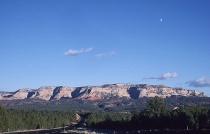 Moon Over Southern Utah 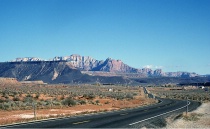 Toward Zion -- John Lind
|
|
|
|
||
|
Kerry L. Walker |
I am really glad that there are still film people out there so we digital people have someone to pawn our outdated film cameras on so we can update our goods to 2005 and beyond! :o) Have two listed on ebay now!! :o) Another reason to go with film. We don't have to upgrade our cameras every year or two to get the best quality output.
|
|
|
|
||
|
John A. Lind |
Gee Kerry, Looks like: (a) You haven't upgraded your cameras in one or two . . . . . . decades Looks as if I've got a decade or so to go before some of my newfangled stuff becomes as outdated as yours. -- John Lind
|
|
|
|
||
|
x |
Kerry, that comment always cracks me up about digital. Even with film I was always buying crap. Maybe not bodies, but other crap. It's the same thing. I have the same amount of disposable income to waste on things as I did before. Now, I just add a new body once in a while. No big deal.
|
|
|
|
||
|
Kerry L. Walker |
John, you are correct. Only it's getting closer to 3 decades. OK, my MF SLR is only a few years old but the 35mm is 26. Has an all METAL body (with some brassing), brass lens mount, built to last, and it has. Doesn't have custom functions, etc., but it will function without a battery if necessary. Jerry, I don't need to buy a lot of stuff. I have all the lenses I need. Replace a flash if it breaks (not very often) and a filter if it gets scratched. Otherwise, I keep my equipment in excellent shape and just keep on shooting. I am old and old school. Don't need or want a lot of automation. I like to tell the camera what to do rather than the other way around. I really have nothing against digital and newer models of cameras. I just don't get caught up in the acquisition of newer and newer equipment. However, if I had the funds, I would like to get a Leica M-7 rangefinder, which, with the exception of the AP automation, is about as old school as you can get.
|
|
|
|
||
|
Kerry L. Walker |
BTW, my point is that "It isn't the violin, it's the violinist" that makes the music. Give me the latesst and greatest digital SLR with 50 custom functions and I would turn it into an expensive paperweight. It's beyond me. Give me an old Nikon F with a 28mm, 50mm and a couple of short tele lenses and I would be right at home.
|
|
|
|
||
|
x |
That's funny, I was just talking to a guy about buying stuff. He's been doing weddings for about 15 years. We were talking about getting new equipment, and he said, "I'm actually all set right now." Then he laughed, and said that that was the first time in his life he has ever said that. I've still got some time to go before I get to that point. I like new gadgets.
|
|
|
|
||
- Bob Cournoyer Contact Bob Cournoyer Bob Cournoyer's Gallery  |
>>I like new gadgets<< That would be my problem. I keep telling myself that I should to learn (LEARN) to use 1 lens before buying another (which I just did). I won't be buying another camera for quite some time because I love the one I have. But I keep wanting to get further and sharper. Maybe I should dig out my old Mamiya-Sekor 500tl (bought in high school when I had a makeshift darkroom in my closet), buy some film and see if I've learned anything about photography these last couple years? That would be interesting, ya think? Bob
|
|
|
|
||
|
Kim Johnson |
What I have discovered, is if you have a great film camera, you're gonna have to get a GREATer digital camera to be satisfied. While digital is REALLY convenient, I had to buy a 20D, to even come close to the features of my film Canon 10s (and it still doesnt have some features, interval timer, multiple exposure ...etc). (I know features are not what makes a good photo). Film is still a better quality to my eyes. If you compare, dont compare on a computer screen compare print enlargements. I had a $200 digital... and the autofocus was horrifically slow. But, I'm happy with my 20D. So if you're going to go digital go, but don't try to be cheap.
|
|
|
|
||
|
John A. Lind |
Kerry, If you don't currently have a rangefinder, working with one is an entirely different world. I've found shooting candids using a completely manual one to be exhilarating . . . at once an observer and a participant in the dance of life with the subject(s), waiting for the decisive moment to record its light. 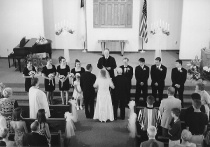 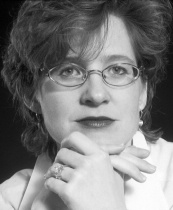 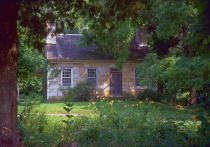  Made with Zeiss Ikon Contax IIIa Rangefinder Camera It will never be obsolete, and will still be operating just fine when the types of digital cards currently in use sunset (along with USB and Firewire ports). The meter works, but I don't trust it completely and use a Weston Master V with Invercone for critical exposures . . . plus my brain for sanity check with lighting conditions and film speed. F/8 and be there! -- John Lind
|
|
|
|
||
- Bob Cournoyer Contact Bob Cournoyer Bob Cournoyer's Gallery  |
Holy Buckets!! It came to me when I was out cutting the grass. What if I am seduced by the dark side (film)?? Just kidding! Just kidding! Just kidding! Bob, who was Just Kidding!
|
|
|
|
||
|
John A. Lind |
Bob, It's seduction by the Dark Slide! And 4x5 (inch) has been tempting me with its siren song for some years now. -- John Lind
|
|
|
|
||
- Bob Cournoyer Contact Bob Cournoyer Bob Cournoyer's Gallery  |
I'm young, John. I'll get it right one day. Dark Slide....Dark Slide....Dark Slide..... :-)
|
|
|
|
||
|
Lucy |
Thank you all very much for your contributions. They will all be very helpful in putting together a successful study. It is greatly appreciated. Again, thank you very much.
|
|
|
|
||
|
Kerry L. Walker |
John, I don't currently have a rangefinder but the first camera I used was an old Argus rangefinder. (Boy, now I'm really dating myself.) It got stolen and I haven't had one since. I really liked using a rangefinder and I don't think I would have any problem picking it up again. The only problem would be using a polarizer filter, which I like to use. It can be done but it's slow. But hey, who's in a hurry when shooting landscapes? For shooting candids, it's very fast (compared to my OM-2n). Being technologically challenged, using a rangefinder would be easier for me than a new digital. (Now every body knows the REAL reason I'm a film dinosaur.) Robert: I am your father. Join me on the dark slide. (OK, my voice is deep but I am no James Earl Jones.)
|
|
|
|
||
|
John A. Lind |
My father used an Argus C3 "bakelite brick" for several decades. He had the large bowl reflector flashbulb handle that used Press 25's. I remember it very, very well . . . especially seeing colored spots for a couple minutes after he used the flash. Excellent lens; simple but extremely reliable leaf shutter. Film? Kodachrome! BTW . . . a bit of history . . . the reason for the bakelite bodies dates to the 1934 when the company that created the Argus was a radio manufacturer, the International Radio Corporation (which also owned all the patents for AC/DC radios). Radio sales were seasonal (mostly around Christmas) and bakelite cases for them were among the most popular. To keep the bakelite molding lines busy (and their people employed) during the off seasons, the company's owner created the bakelite body camera and put a first class lens on it. Introduced in 1936, their first ad campaign was in the first issue of Life Magazine. Eventually the Argus cameras completely overtook all their radio production/sales and they became a camera company. The Argus likely did more to solidify 35mm as a film format than Leica and Zeiss-Ikon ever did . . . by the sheer numbers of them they sold . . . into the tens of millions. -- John Lind
|
|
|
|
||
|
Bob Doyon |
Everything including our lives will have a sunset. Enjoy technology! Go digital.
|
|
|
|
||
|
This old forum is now archived. Use improved Forum here
Report this Thread |
||